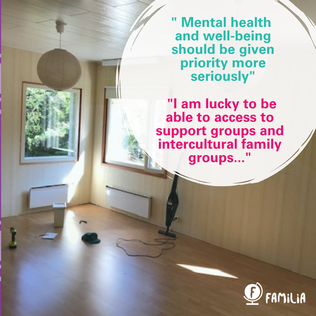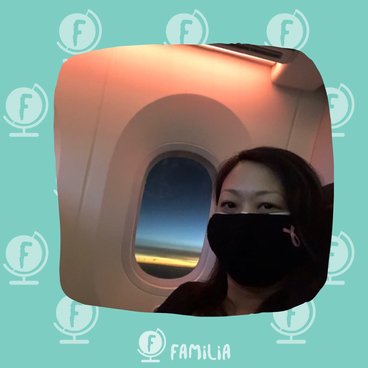|
Picture: Our empty room when we arrived in Helsinki This year the world mental health day falls on the 10.10.22 and the theme is “Make mental health and well-being a priority for all”. What does it mean to all of us, especially intercultural families who have challenges integrating to a new society? Mental health issues are on the rise especially during and after the Covid-19 pandemic crisis which affected many people globally where they had to be confined to homes, lost their main source of incomes, lost their loved ones and a complete shutdown in their everyday lives. When Covid-19 struck, we had to learn to fast track to deal with mental health and wellbeing issues all of a sudden , unprepared like a bunch of kindergarten children on the first day of school. I am no exception to them. Here is my transition story moving from a big city, Kuala Lumpur to a quiet town of Sipoo, 30 km east of Helsinki a year ago. I come from an intercultural family where my Finnish husband speaks Swedish and Finnish; and on my side, my mother tongue is Cantonese and I learned Bahasa Malay, English and Mandarin in my formative school years. Our common household language is English with our children. I am lucky to be able to access to support groups and intercultural family groups here like Familia or Spouse Program to share my woes and lament unlike back home in Malaysia. For example, Familia has given me a place or platform to share my thoughts and mix with other intercultural families who may be going through what I went through in life situations such as the severeness of digital exclusion, seeking employments, choice of children’s education development or discriminatory actions of certain groups of minority. The Covid-19 pandemic crisis exploded in March 2020 while we were living in Malaysia. This is how it all began. All businesses were shut down, employees worked from home, schools were closed indefinitely and children had to suddenly jump onto the bandwagon to do home learning. All activities like social, sport, schools events and even family gatherings were prohibited. Then, the Movement Control Order (MCO) was put in place for a few months. This crisis has been ongoing on and off for 2 years from MCO1.0 to MCO 3.0 to Enhanced Movement Control (EMCO) to RMCO (Restricted Movement Control Order) with very bad government management while this pandemic continually ripped apart lives, socio-economically, mentally and psychologically. Families quarreled and some were not spared from physical to mental abuse. It has inevitably split families apart instead of drawing them closer due to the constant mental stress of living in small confined areas for a long period of time. In my case, the pandemic has affected me mentally too as I had lost my business income, and all the freedoms to do leisure activities and all of a sudden I had to learn to deal with not only my kids online learning, but all the never-ending household chores and no support to speak to anyone about my mental well-being. I lost focus, burnt-out and annoyed most of the time when my family needed me, and my mental health was deteriorating. I didn’t know how to seek help except venting my frustrations at anything and anyone I could find faults at. I am sure that the similar situations will be affecting many intercultural families living in Finland also. As a matter of fact, my husband also quit his job during the pandemic as he couldn’t handle the work stress but nevertheless, he didn’t fail to provide emotional support to me and listened to my dilemma while dealing with his own stress. We talked endlessly about moving back to Finland and finally on July 31 2021, the move happened! We booked a one-way ticket to Finland! We had to let go of almost everything we built in Malaysia for the last 20 years, our careers, our beautiful home and our lives and many friendships to restart to build a family life in a new environment. Photo: On board the plane to Helsinki uncertain about new adventures In the beginning, after we arrived, we had to deal with a lot of bureaucracy from opening bank accounts to getting an appointment in the police department to get a valid ID. All these would require time and mental patience. As a newcomer to Finland, digital exclusion did affect my mental wellbeing. Not only did it happen to me but I am sure it also affects many people, newly arrived immigrants and even Finns who have moved overseas to live for a long time are back to live in Finland.
In the midst of all these chaos, I was also trying to enroll in a Finnish language course here, but it wasn’t an easy task either if you don’t have a bank authentication ID to begin with. 6 months have passed wondering what and where my life adventure would take me next, and then winter darkness crept in. I was so blessed to be in a tropical country with warm weather all year round almost all my life, except living in Western Australia as a student for 3 years but winter there is no comparison to Finland. While all these new adjustments were taking place, I was also trying to find a job here and attended many workshops to find my networks. Slowly time passed from 6 months to a year and all these job-seeking and finding life purpose were starting to take a toll on my mental health even more. Taking care of my children’s transition to a new environment and school also added extra stress to me. Sometimes, I would just cry myself out aloud alone, but I was only seen as “weak” and helpless when I cried. The transitions and integrations into a new country made me feel worse when I constantly read reports and news from my home country that suicide rates are on the rise among teenagers, youth and young families due to employment losses, work-life conflicts, social-economic situations, relationships issues, gender inequality, self-values and many other issues that the society there was too quick to judge others in need without understanding the impact of mental illness. While Finland fares much better than the rest of the world, the mental health illness and well-being have also trended upwards after the pandemic. Covid-19 has left severe negative effects such as anxiety, depression and suicidal thoughts mostly on young people and women’s mental health and well-being . (click here for the source). Many challenges need to be overcome to manage and reduce the backlog of the burden on the healthcare and social support system. Mental health and well-being should be given priority more seriously. I want to think that I am blessed in a way that I am given the opportunity to live in a new country, experiencing a new life, although there will be struggles. I am lucky to be able to access to support groups and intercultural family groups here like Familia or Spouse Program to share my woes and lament unlike back home in Malaysia. For example, Familia has given me a place or platform to share my thoughts and mix with other intercultural families who may be going through what I went through in life situations such as the severeness of digital exclusion, seeking employments, choice of children’s education development or discriminatory actions of certain groups of minority. And also, I found myself volunteering at Familia, to help with what I can do for the society. At least, life is a blessing that I still have a loving family here who is very supportive of me and what I want to do in the future. I am taking small steps at a time, learning everyday to deal with new things, new languages and I haven’t given up hope yet of finding employment in this country as I want to live my life with a purpose. Fenny Communication Volunteer Familia ry Sources, click here.
1 Comment
30/6/2024 18:20:15
What challenges did the author face when moving from Kuala Lumpur to Sipoo during the pandemic? Regard <a href="https://journals.telkomuniversity.ac.id/">Telkom University</a>
Reply
Leave a Reply. |
blogi - blogAjatuksia ja kokemuksia elämästä kahden kulttuurin keskellä.
Reflections and experiences from the life of intercultural families. kategoriat
All
osallistuToivotamme sinut lämpimästi tervetulleeksi osallistumaan blogiyhteisöömme: lue, kommentoi ja kirjoita!
Kirjoittajina voivat toimia kaikki kahden kulttuurin arkea elävät ja aiheesta kiinnostuneet. Kynnystä kirjoittamiselle ei tule nostaa liian korkealle ja kirjoittaa voi joko omalla nimellä tai nimimerkillä. Blogissa esitetyt näkökannat ja mielipiteet ovat kirjoittajien omia, eivätkä edusta Familian kantaa. Kahden kulttuurin arki on itsessään kiinnostavaa ja siitä kirjoittaminen voi avata myös itselle uusia näkökulmia! Blogikirjoituksia voi tarjota sähköpostitse (info@ familiary.fi) tai yhteydenottolomakkeen kautta. Lopullisen valinnan julkaistavista jutuista tekee Familian henkilökunta. Tervetuloa mukaan! participate!We warmly welcome you to participate in our blog community: read, comment, and write!
Anyone who lives and works in the world of intercultural families and is interested in the topic is welcome to contribute. The threshold for writing should not be too high, and you can write either under your own name or under a pseudonym. Keep in mind that the views and opinions expressed in the blog are those of the authors and do not represent the position of Familia. The everyday life of intercultural families is interesting and writing about it can also open new perspectives for you! Your story matters and helps to raise awareness about the opportunities and challenges within intercultural families. Blog contributions can be submitted by e-mail (info@ familiary.fi) or via our contact form. Final selection and edition of the stories to be published will be conducted by our staff. Welcome to join us! |
|
|
© Familia 2024



 RSS Feed
RSS Feed

